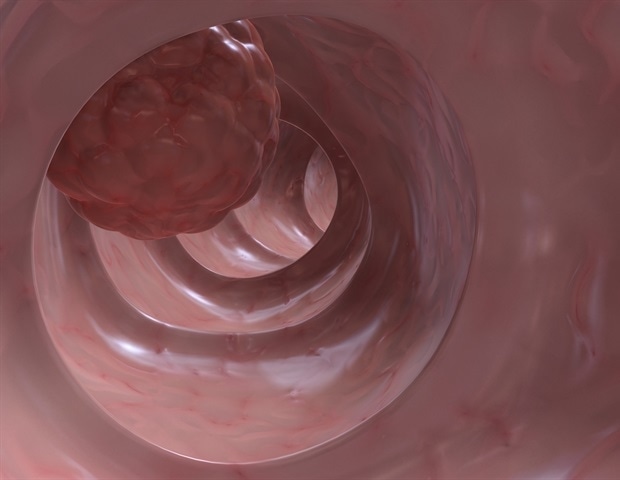
An information evaluation from a randomized scientific trial for stage 3 colon most cancers sufferers by investigators at Dana-Farber Brigham Most cancers Heart discovered that sufferers with proof of residual most cancers of their blood after surgical procedure to take away the most cancers, might profit from including of celecoxib, to submit surgical procedure remedy. The evaluation confirmed that sufferers with constructive blood assessments for circulating tumor DNA (ctDNA) had worse outcomes basically, however those that had been handled with celecoxib, a non-steroidal anti-inflammatory drug, skilled considerably improved disease-free survival.
“This is among the first research to point out that ctDNA standing has predictive utility when it comes to choosing sufferers that reply higher to a drug,” says Jonathan Nowak, MD, PhD, a pathologist at Dana-Farber Most cancers Institute and Brigham and Ladies’s Hospital who presents the examine on the American Society of Scientific Oncology Gastrointestinal Cancers Symposium on Jan. 25, 2025, in San Francisco, Calif.
These outcomes add to our earlier findings that celecoxib improves survival for PIK3CA mutated colon most cancers. These findings will assist develop a personalised method to extra remedy for sufferers with early-stage colon most cancers.”
Jeffrey Meyerhardt, MD, MPH, senior creator and co-director of the Colon and Rectal Most cancers Heart at Dana-Farber Most cancers Institute
Sufferers with stage 3 colon most cancers are initially handled with surgical procedure to take away the most cancers within the colon and close by lymph nodes. After this remedy, they usually obtain adjuvant chemotherapy meant to cut back their danger of the most cancers coming again. In a subset of those sufferers, nonetheless, the most cancers returns, probably rendering them incurable. A key analysis focus at Dana-Farber is discovering methods to enhance adjuvant therapies and stave off recurrence.
To research using celecoxib on disease-free survival in sufferers with stage 3 colon most cancers, Meyerhardt and colleagues initiated a randomized scientific trial, the CALGB (Alliance)/SWOG 80702 trial, in 2010 with the Alliance for Scientific Trial in Oncology and the Nationwide Most cancers Institute. The trial enrolled 2,526 sufferers between 2010 and 2015. After remedy, sufferers had been randomized to obtain adjuvant chemotherapy with fluorouracil, leucovorin, and oxaliplatin (FOLFOX) for 3 or six months with or with out each day celecoxib for 3 years. These taking celecoxib confirmed a average profit, however the outcomes, which had been printed in 2021, weren’t statistically vital.
Proof has since emerged suggesting that anti-inflammatory medication would possibly profit some sufferers with colon most cancers, however not others. One chance for that is that sufferers who’ve a blood check quickly after surgical procedure exhibiting proof of ctDNA have a better danger to relapse and will profit from extra therapies past commonplace chemotherapy. On this new examine, investigators wished to discover whether or not anti-inflammatory medication would possibly assist stave off relapse in sufferers whose ctDNA check was constructive quickly after surgical procedure.
When the unique potential celecoxib scientific trial was designed a decade in the past, sufferers had been assessed earlier than and after surgical procedure utilizing imaging, which reveals the place most cancers cells have clustered, however has restricted decision. The ctDNA assessments accessible immediately present a extra delicate learn on whether or not most cancers stays after surgical procedure by detecting microscopic fragments of tumor DNA within the blood.
The examine crew recognized 1,011 of two,526 sufferers who had participated within the unique trial and had agreed to have blood drawn for analysis functions that was accessible for evaluation. They carried out ctDNA assessments on blood samples taken after surgical procedure. This evaluation revealed that sufferers with constructive ctDNA typically had worse outcomes. Nevertheless, these with constructive ctDNA assessments who had been prescribed celecoxib along with commonplace chemotherapy had considerably improved disease-free survival in comparison with those that acquired solely commonplace chemotherapy. For individuals who had unfavourable ctDNA assessments, there was no vital distinction between these taking celecoxib versus placebo.
“Primarily based on this evaluation, the advantages of celecoxib with chemotherapy look promising for early-stage colon most cancers sufferers with constructive ctDNA after main remedy,” say the investigators. “This proof plus outcomes from different ongoing research will assist decide which sufferers might profit from celecoxib along with different commonplace therapies.”
